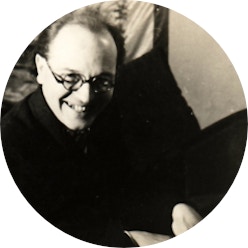
Olivier Messiaen
December 10, 1908 - Avignon (France) — April 27, 1992 - Clichy-la-Garenne (France)
About
“I give bird songs to those who dwell in cities and have never heard them, make rhythms for those who know only military marches or jazz, and paint colours for those who see none.” Olivier Messiaen Coming from a literary and artistic rather than a musical family, Olivier Messiaen had an unusually wide frame of reference. He grew up thoroughly “centred”, despite a childhood disrupted by the Great War; and the gift of Debussy’s Pelléas et Mélisande from his first harmony teacher set him on his way. His own opera did not come until the end of his life but he excelled in music for his own instruments, piano and organ, as well as songs and orchestral works. He is also honoured for his use of birdsong, for founding the Jeune France group and as a great and open-minded teacher. 1919–30: Studies at the Paris Conservatoire; wins many prizes during that time, among them first prizes for organ and composition, and the Diplôme d’études musicales supérieures. 1931: Appointed titular organist of La Trinité in Paris, where for over 60 years he supervises one of the great Cavaillé-Coll organs. 1935: Composes his biggest work of that period, the organ cycle La Nativité du Seigneur. 1935: First concert of La Jeune France group, comprising Messiaen, Yves Baudrier, André Jolivet and Jean-Yves Daniel-Lesur. 1939–41: Called up for military service at the outbreak of World War II; captured and brought to a prison camp in Silesia; composes his by then most ambitious work Quatuor pour la fin du temps, premièred by him and three other POWs in winter 1940–41. 1941: Begins teaching harmony at the Paris Conservatoire. 1952–53: Studies with the ornithologist Jacques Delamain; begins intensive birdsong research in the French countryside; première of Réveil des oiseaux in October. 1962: Première of Chronochromie for large orchestra, the culmination of his birdsong period; journey to Japan for performances and collecting bird songs. 1966: Appointed Professor of Composition at the Paris Conservatoire; elected to the Académie des Beaux-Arts de l’Institut de France. 1975–83: Composition of his opera Saint François d’Assise, première at the Paris Opéra in 1983. 1978: Retires from the Paris Conservatoire. 1984: Last organ work: Livre du Saint Sacrement. 1988: Receives the Pope Paul VI International Prize; travels to Australia for performances and to collect bird songs; his health begins to decline. 1988–92: Commissioned by the New York Philharmonic he composes his last major work, Éclairs sur l’Au-delà…

